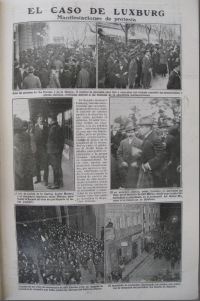Crisis↑
In 1917 Germany returned to its strategy of unrestricted submarine warfare, precipitating United States' entry into the war. German-Argentine relations became very tense because of the sinking of Argentine ships in April and June. In September the U.S. Secret Service deciphered and published secret dispatches by the German chargé d’affaires in Buenos Aires, Count Karl von Luxburg (1872–1956). In his telegrams, Luxburg demanded the sinking of Argentine ships “without a trace” and called the Argentine foreign minister, Honorio Pueyrredón (1876–1945), a “notorious ass.”[1] What motivated the aristocrat to commit such a disastrous blunder is not known, but the revelation brought both countries to the brink of war.
Solution↑
The publication of Luxburg’s insulting messages sparked a heated debate in the Argentine congress. Since April, a strong pro-Allied lobby, among both parliament and the public, had demanded that ties with Germany be severed; some wanted Argentina to enter into the war on the Allied side. Impressed by public mass demonstrations, a large majority now voted for the rupture of diplomatic relations. Luxburg himself was declared persona non grata and interned. Contrary to its policy against other neutral states, the German leadership tried to keep Argentina neutral and apologized for the diplomat’s faux pas. Still, it was the Argentine president Hipólito Yrigoyen’s (1852–1933) stubborn resistance against the rupture which prevented the country’s entry into the war. Much has been speculated about the reasons for Yrigoyen’s stance. Economic reasons as well as the rivalry with Brazil and the United States for leadership in the Americas were surely motivating factors.
Stefan Rinke, Freie Universität Berlin
Section Editor: Frederik Schulze
Notes
- ↑ Kannapin, Klaus: Die Luxburg-Affäre. Ein Beitrag zur Geschichte der Beziehungen zwischen Deutschland und Argentinien während des Ersten Weltkrieges, in: Wissenschaftliche Zeitschrift der Humboldt-Universität Berlin 13 (1964), p. 880.
Selected Bibliography
- Doß, Kurt: Das deutsche Auswärtige Amt im Übergang vom Kaiserreich zur Weimarer Republik, Düsseldorf 1977: Droste.
- Kannapin, Klaus: Die Luxburg-Affäre. Ein Beitrag zur Geschichte der Beziehungen zwischen Deutschland und Argentinien während des Ersten Weltkrieges, in: Wissenschaftliche Zeitschrift der Humboldt-Universität zu Berlin 13/7, July 1964, pp. 879-882.
- Lanús, Juan Archibaldo: Aquel apogeo. Política internacional argentina, 1910-1939, Buenos Aires 2001: Emecé Editores.
- Solveira, Beatriz Rosario / Ministerio de Relaciones Exteriores y Culto: Argentina y la primera guerra mundial. Según documentos del Archivo del Ministerio de Relaciones Exteriores y Culto, 2 volumes, Córdoba 1979: Centro de Estudios Historicos.









